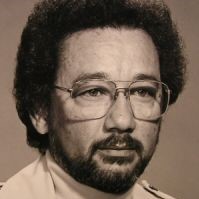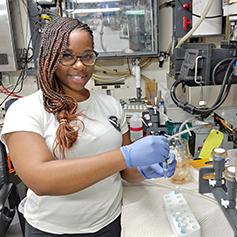Robert Kent Trench—Dr. Henry Neal Williams—Dr. Dawn Wright—Dr. Jeanette Davis
Many Black Scientists have influenced marine science, most of whose legacies are often overlooked or forgotten altogether. The trailblazers highlighted here – Robert Kent Trench, Dr. Henry Neal Williams, Dr. Dawn Wright, and Dr. Jeanette Davis – have contributed to the fields of microbiology, medicine, and geographic information systems, as well as newly created fields of study, completely changing the way we look at our oceans.

Robert Kent Trench, known for his work on coral and their algae, has widely been regarded as the founder of a field of study based on mutualistic symbioses in marine environments. Trench was born in Belize, British Honduras in 1940 and was raised fishing on Belize’s coral reefs. This fascination with coral led to an undergraduate degree from the University of the West Indies (UWI) in Jamaica where he quickly became interested in marine science. Robert Trench joined the coral research team of a small research laboratory, working under Tom and Nora Goreau. Tom taught Trench how to dive and research underwater and Nora showed him how to examine marine organisms using a microscope. Trench graduated from UWI with a degree in zoology and achieved his Ph.D. at the University of California at Los Angeles. There he worked on the biochemical compounds exchanged between corals and algae. Goreau trained Trench to become Director of the Discovery Bay Marine Lab, but after Tom’s passing, control of the lab was left to the British Zoology Department staff at UWI who, due to racial prejudice, decided to give the job to another. Sadly, it was not the last time Robert Trench would be passed over in his career because of the color of his skin. Later in life, Trench would face adversity in earning grants and being promoted, eventually leading to his early retirement.
When new fields of study were quickly being discovered, Robert Trench decided that not enough was known about coral and its symbiotic relationship with algae. Using a microscope, Trench explored the internal structures of the algae. Through this research, Robert Trench discovered many species of symbiotic algae were linked to a single host species. Each of these algae and coral pairings had their own complex evolutionary history. This new field of biodiversity became the life work of Robert Kent Trench, leaving a legacy that can hopefully save our coral reefs in their battle against modern climate change.

Henry Neal Williams, born in Rocky Mount, NC, first became interested in science in ninth grade. The following year, a teacher encouraged this fascination, eventually leading Williams to earn a Biology degree at North Carolina A&T University. Dr. Williams decided to pursue a Master of Microbiology before completing a Ph.D. in Microbiology, both from the University of Maryland at Baltimore. Along with being a professor at Florida A&M University, Dr. Williams has been a member of the American Society for Microbiology (ASM) for over 40 years. In 1980, ASM selected him as the American Society for Microbiology Congressional Science Fellow, serving under the office of Senator Charles, McC. Mathias for a year. Dr. Henry Neal Williams became an ASM Distinguished Lecturer in 2016, making Florida A&M University the first historically black college or university (HBCU) to have a full-time faculty member in this position. This allowed Williams to not only lecture nationally about his work with predatory bacteria, but to tell his own story and encourage students from minority backgrounds to join the marine science field.
Dr. Williams’s primary research focus is the study of predatory bacteria, or Bdellovibrio. Fortunately, these bacteria are not harmful to humans but instead control the population of other marine bacteria. Now, Dr. Williams focuses on how and when this group of bacteria controls other bacteria, and under what conditions this type of predation occurs. Although predatory bacteria were often overlooked due to their small numbers, Dr. Williams has proven that they play an important role in the environment and possibly in medicine. Some researchers theorize that these bacteria can treat certain infectious diseases!
Dr. Henry Neal Williams recognizes that not many Black scientists are given the opportunities that he has earned. He hopes that his work as a prominent microbiologist in the marine sciences will allow people to see the value of including people from all backgrounds in scientific research. Dr. Williams is proof that barriers will not hold Black scientists back from achieving excellence but also highlights the fact that these barriers still exist in 2025 and need to be overcome.


Dr. Dawn Wright was born in Baltimore, MD in 1961 but spent many of her younger years in Hawaii on the island of Maui. It was there that Wright discovered her love for the ocean and gained a passion for science in general. After graduating high school, Wright went on to Wheaton College where she earned her bachelor’s degree in Geology. Dr. Wright knew all along that she would eventually study oceanography, ending up at Texas A&M University. During her time there, she participated in her first ocean cruise where she collected data on the Tonga Trench in the southwestern Pacific Ocean. Wright completed her Master’s thesis on marine gravity using the data collected from this cruise. Following her graduation from the Master's program, Dr. Wright became a marine technician with the university’s Ocean Drilling Program, spending three years collecting samples of rock and sediment from all over the planet. Wright began her Ph.D. at the University of California – Santa Barbara where she participated in several deep dives in an ALVIN submarine. Wright became the first black woman to dive to the sea floor and her deep-sea exploration trips eventually earned her the nick name “Deep Sea Dawn.”
Dr. Dawn Wright is now the chief scientist of Esri, one of the world’s largest geographic information systems (GIS) software, research, and development companies. Wright helps advance Esri’s work on environmental, conservation, climate, and ocean sciences and represents the company amongst the national and international scientific communities. As an oceanographer at heart, Dr. Wright leads a large ocean GIS initiative across the company, working to improve the mapped data of the ocean. She teams up with scientists across the world using GIS to map terrains, ecosystems, and habitats. Wright, along with the GIS community, continues to develop data models to analyze the ocean.
When she was a graduate student, Wright was told to change career paths to something other than oceanography. Now as an oceanographer, she made a commitment to mentor and guide students and young professionals. She works with many programs such as the DOERS (Deep Ocean Early Researchers) Early Career Mentor Program, ESRI’s Student Programs, and Skype-a-Scientist. Dr. Wright continues to share her career journey because she believes that no one has the right to tell other people they don’t belong.

The world of marine science has been influenced by many distinguished Black scientists, one of which being Dr. Jeanette Davis or “Dr. Ocean” as she is affectionately known. Davis was born in Wilmington, DE where she enjoyed spending time outside and experimenting with what she found in nature as a child. During her first undergraduate summer, Davis interned with Multicultural Students at Sea Together where she spent one month sailing the Chesapeake Bay on a 53-foot sailboat. In 2008, she graduated with a B.S. in Marine and Environmental Science and later earned her Ph.D. in Marine Microbiology from the University of Maryland. Although her career focused on the microbiology aspect of marine research, often examining DNA and RNA, Davis could not ignore her passion for public policy. Now, she continues her work in both microbiology and medicinal research in connection with environmental policy.
As a Ph.D. student, Dr. Jeanette Davis’s project worked with sea slugs in a bid to understand the bacteria associated with various marine invertebrates. One such compound was extracted from a Hawaiian sea slug. This compound had promising anti-cancer properties, and it was Davis’s job to determine where in the DNA of the slug the compound was found. She compared the DNA from the compound to that of the slug’s genome to determine where the two sequences matched. After a lot of research into understanding the DNA, RNA, proteins, and metabolites of the samples, Dr. Davis isolated the metabolites producing the compound. These metabolites were a defense mechanism for the slug, but an anti-cancer compound for humans.
Dr. Jeanette Davis is currently working as a marine microbiologist at the National Ocean and Atmospheric Administration Fisheries in the Office of Policy. In this position, Davis conducts research on medicinal compounds and provides support for policies that relate to resources in the ocean. Dr. Davis's work extends beyond the United States, and she travels to over a dozen countries where she speaks about ocean science.
Outside of the marine microbiology field, Davis is an champion of community, founding the Marquis Pressey Scholarship which is awarded yearly to two African American males in her hometown of Wilmington, DE. Her other pursuits include writing two children’s books: Science is Everywhere: Science is for Everyone and Jada’s Journey Under the Sea. These books encourage young children to be curious about the world around them and to pursue a career in the STEM fields. As a woman in STEM, Dr. Davis understands the importance of women building a community of support for one another and telling their own stories. She hopes that sharing her story will inspire the next generation of women to become scientists.
